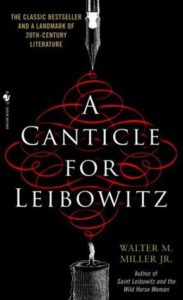
It looks like the October book clubs conspired to push me into reading genre classics that I’d been meaning to circle back around to for ages. So right after finishing The Haunting of Hill House (which I still haven’t reviewed, I know it’s two months later, stay tuned), I jumped right into A Canticle for Leibowitz by Walter M. Miller Jr.
A Canticle for Leibowitz takes place after a nuclear apocalypse that leaves most human life destroyed, with a small number of mutants and survivors roving a hostile landscape, killing to survive and killing as vengeance against those learned whose study enabled the disaster in the first place. The book focuses on a small monastery somewhere in the American Southwest, in which a small Catholic sect attempts to preserve whatever learning they can. Each of the book’s three parts focuses on a different monk, giving three snapshots of monastic life situated against three very different worlds, with centuries in between.
While it’s not an especially long book, each section is slow-paced, with philosophical questions about the stewardship of learning and how it relates to the political landscape interspersed with plenty of monks going about their day-to-day lives, with more than a little Latin sprinkled throughout the text. As a reader who enjoys both philosophizing and glimpsing the lives of those outside the power structures of the world, you’d think this would be everything I wanted in a book. And indeed, I found the musings on stewardship of learning to be some of the strongest elements, with the development of the world prompting fascinating questions about the pursuit and sharing of knowledge in a context where technological development has led to disaster in the past.
But there’s a reason my love of regular people in sci-fi worlds is often concentrated in short fiction. It doesn’t take a grand plot to sustain my attention for 20 minutes, but in a story that spans hundreds of pages spread over multiple reading sessions, I find it helpful when there’s more of a central narrative thread. But A Canticle for Leibowitz both stars those on the fringes of the global (or even national) story—something that can work very well, but requires particularly interesting fringe perspectives—and switches the perspective at the close of each section. The reader can see how things develop and how the choices of those at the monastery have affected the world, but they’re neither driving the change nor zooming in on how those changes affect any figure in particular. It’s fascinating as an ideas book, but it very much is an ideas book, offering neither central plot nor central character to drive the momentum.
That’s not to say there aren’t some excellent character moments, as the monks are more than a few times faced with a practical challenge to their ideals. In many ways that’s part and parcel with it being an ideas book, but the internal struggles are very good. But the style leads to a reading experience that feels a little fragmented, with characters and plot threads that are simply dropped as the relevant section ends. It’s hard to say that’s unrealistic—after all, how many quiet personal moments in real life essentially amount to nothing on the scale of generations?—but it’s a little unsatisfying all the same.
My habit is to assign books a numerical rating, one I hope is responsive to its objective quality but is inextricably filtered through my own idiosyncratic reading experience. A lot of the time, it’s easy to find a number that I feel pretty comfortable publishing. This time, it’s not. I’m tagging this with a “this was a good read but not best-of-the-year level” rating, but each person’s experience will vary wildly by what they’re looking for in a book. Even if I give this four stars, I’d strongly warn off any reader looking for a thrilling plot or intimate character study. On the other hand, for readers who enjoy philosophical sci-fi and don’t need a strong central narrative thread, this could be an all-time favorite. Act accordingly.
Recommended if you like: ideas sci-fi, mundane characters, religious sci-fi.
Can I use it for Bingo? It very much features Mundane Jobs, and there are a few Robots in the third act.
Overall rating: 15 of Tar Vol’s 20. Four stars on Goodreads.
